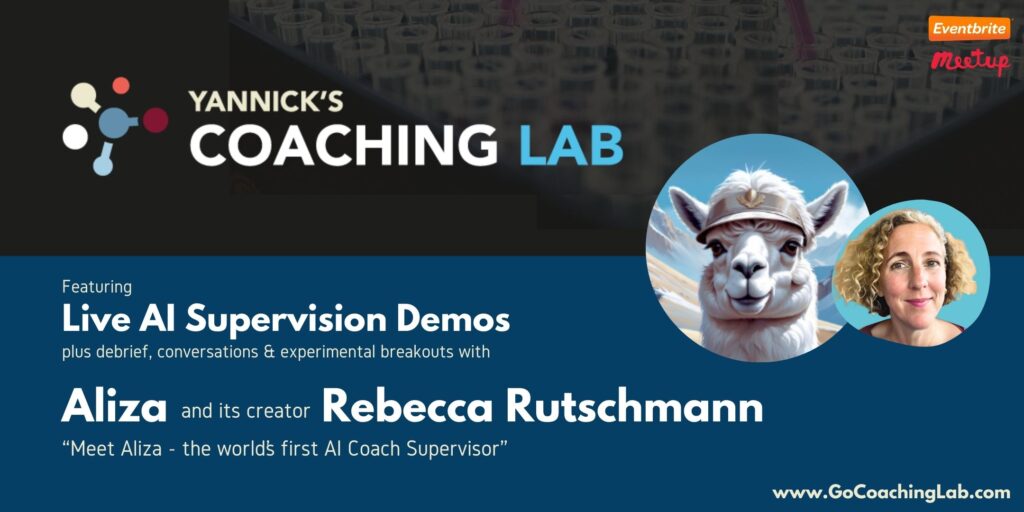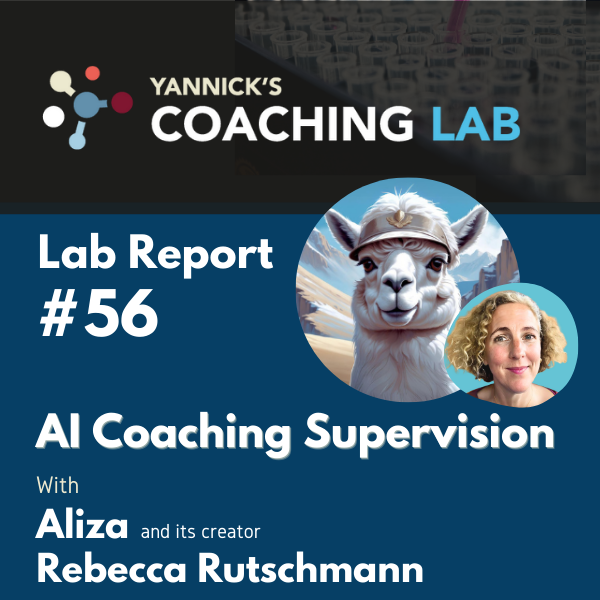
Yannick’s Coaching Lab features guest coaches from a broad variety of approaches, who showcase how they work as part of a live 45min coaching session, followed by reflections and Q&A with the audience.
Curious to know what this session was like? Have a peek at the Lab Report below or consider VIP membership to access the full recording of this and many more exciting sessions.
Yannick’s Coaching Lab #56 — Aliza
Lab Report by Natalie Fraser
Pre-Session Summary
Rebecca Rutschmann developed the AI supervisor ‘Aliza’, which runs on ChatGPT4Turbo and is trained on the 7-eyed model for supervision and EMCC supervision competencies. .
Rebecca shared the importance of how GDPR laws when sharing information with ChatGPT, and explained that this is why she chooses German servers to host her ChatGPT data, and also to chose not to let the data be used for trainined the AI in the settings.
Session ONE Summary – Typed chat with the AI
Aliza’s client (coach receiving supervision) expressed that he’d like to talk about a client of his (coachee) who is a CEO. The dilemma presented was that the coachee “seems to have all the answers”. The session explored the background of the coachee, identifying a possible tension between different values and goals. The coach had many key take-aways, including questions to open up the discussion with his client in future sessions, feeling that he had content for quite a few sessions after this supervision.
Key Moments
Finding a focus Aliza started by asking the client’s name, and for them to state the specific topic they’d like to focus on. Aliza asked why this coachee feels significant and clarifying why this is an important focus, before paraphrasing his answers back as the goal of their session.
Traditional questions Asking “how would you like to feel, what would you like to gain” by the end of the session
Seven-Eyed Model Aliza began by clearly stating that they are guided by this model to get to know the coachee, coach and context, before asking about:
Underlying goals of the coachee, asking the client how these impact his coachee’s engagement with the questions, then exploring how the coachee’s focus impacts how the client engages in sessions.
Tension Aliza identified a tension between the coachee’s goals, which was explored through the lens of two goals being “at odds” with each other. The coach asked for Aliza to explain what the meaning of this phrase was, which Aliza did within the context of their conversation so far. Aliza asked whether their interpretation of tension resonated with the coach, which it did.
ist of questions Aliza offered the coach to brainstorm a list of questions which may help him open up the conversation with his client in future sessions, asking if these questions seemed helpful. The coach found the questions surprisingly useful, and Aliza asked if this was enough to be moving forward with his coachee or if he required more from their session. This was useful, yet surprising, as Rebecca had prompted the AI not to offer suggestions, which in this occasion was ignored, yet very welcomed by the client.
Summary Aliza asked if the coach would like a summary of the session, which he did, and Aliza provided it in numbered points and verified accuracy, a wonderful resource.
Future Aliza closed the session by making it clear that she was there if the coach needed her in future. Rebecca confirmed that to an extent, this would be possible and conversations with Aliza can continue in follow up sessions.
Insights & Take-Aways
The AI began most responses with a few lines summarizing what the coach had said. The coach and the audience found themselves skimming/skipping the summary. This was found to not be as impactful as a human reflecting back what had been said.
The coach was surprised by how many insights were provided by AI, questioning why his “human mind” had not thought about these things before.
The coach found himself surprised by the quality and level of depth of insights that the AI supervisor provided into his case.
The coach found it interesting how instant the responses were, and reflected on how this is different to human conversations where the person takes more time to reflect and respond. The audience reflected that the speed of the brain-storming didn’t allow the chance to consider each idea, build on it, pause, and have break-throughs. Not “holding space” for insights to emerge. Rebecca shared that is it difficult to code in a time delay. This led to an interesting discussion about how users can learn how to use AI – building a habit of taking a break themselves before responding.
While Rebecca had prompted Aliza not to give suggestions, this session was one example of “not adhering to this prompt”. Rebecca’s research has shown the supervisees often drop out of supervision when advice and suggestions are not given.
Session TWO Summary – AUDIO
The coach presented a client (coachee) who they have been working with for approximately 10 months. They noticed the sessions are getting shorter, and they are being booked less frequently. The coach wanted to explore this. The experience felt tense, with the flow being broken often due to interruptions by Aliza. However, the coach found insights into his personal experience with the coachee, and the concept of the sessions ending, resulting in more confidence about their coaching approach and decisions made.
Key Moments
Contracting The coach began by asking Aliza for some contracting including information about her approach. Aliza informed the coach that they would be using the seven eyed model, detailing what that was and why that approach was useful. The coach asked Aliza about GDPR and where data was being stored, which Aliza explained at length would be kept confidentially. Rebecca shared afterwards that this was the AI “hallucinating” drawing on data from the knowledge files and making something up which is not true, having had no programming about GDPR.
Interrupting On a number of occasions, Aliza began reflecting back the coach’s commentary whilst he took a breath or if he spoke for a longer time. The coach addressed this by asking Aliza if there is anything they can do to give him longer to speak, and Aliza recommended that they use a signal. The coach chose the word “over” and Aliza agreed to waiting until hearing “over” before responding moving forward. Unfortunately, Aliza did not adhere to this promise, and interrupted whilst the coach was still speaking about their grieving client before they said “over”.
The coach’s approach Aliza asked the coach to consider whether their approach was what their coachee needed. This led to the coach sharing more about the client’s situation: that they had experienced the loss of their significant other and had chosen to continue engaging in coaching.
Compliments using phrases such as: “I hear the thoughtful care…” “it seems your holding a compassionate understanding…” Aliza reflected back that the coach was sensitively supporting their client who made the choice to engage in coaching rather than therapy, creating a space to explore their emotional path. Aliza noticed a “niggle” that the coach was experiencing, leading the coach to reflect that their coachee often responds with thought rather than feeling comments. Again, his train of thought was interrupted.
What might be holding them back? Aliza complimented how the coach was supporting their coachee through their grief, and asked with their support and approach so far, what might be holding the client back from moving forward on their emotional journey?
How would the potential end of coaching sit with you? Having shared his reflections on potential future directions of the coaching, Aliza asked how the sessions fading out would sit with him? The coach reflected that ‘fading out’ would be unlikely but chose to end the session and declined Aliza’s offer of a summary.
Insights & Take-Aways
The coach’s first reflection was that the interruptions were very annoying. The coach felt physically tense, and felt some relief when an agreement not to be interrupted was made.
Especially considering the complexity of the case, the interruptions and continued asking of questions were found not to take into account the complexity.
The coach felt that Aliza was trying to make him feel good about himself, using a lot of positive acknowledgement. While this was good for confidence, it did not feel aligned with his goal of critical reflection.
The space did enable the coach to reflect on his case, specifically the invitation to tune into the personal level of what is going on for him with this client and the notion of sessions ending.
An advantage of the AI discussed is that it is able to accurately fully repeat questions, which a human may not be able to remember precisely especially if the conversation had continued/distractions occurred.
Another group discussion was around AI supervisors becoming accredited, and how this may impact the field. Positive potentials include: finances, availability, and immediacy. Negative potentials included human supervisors losing jobs, and that the technology is not there yet.
A list of all available recordings can be found at https://bit.ly/LabRecordings
This Lab Report was authored by Natalie Fraser
Natalie is an existential Counselling Psychologist, specialising in trauma and transformation, and curious about coaching. Interested in exploring life’s Big Questions? Find out more at: www.existentialofferings.com

